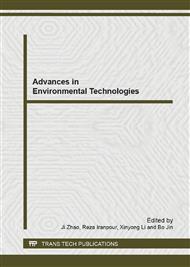p.3627
p.3633
p.3638
p.3642
p.3646
p.3653
p.3657
p.3662
p.3668
Indicator System Construction for Recycling Society
Abstract:
For the justice between generations, the concept of sustainable development has become the tendency of national development in 21 century. The guideline and indicator system for sustainable development were established already in Taiwan. The issues of eco-city, health-city or sustainable city have discussed in several cities these years. However, the key point of sustainable development is to reduce consumption of resources. A recycling-based society is the ultimate aim. In this research, issue-based indicator framework was adopted to construct an indicator system focused on the assessment of recycling representation in a city. With the considerations of resource input and recycling, the performance of resources utilization can be realized. Top five cities in Taiwan were selected as the case study. Other assessment results from existed indicator systems were compared with the proposed indicator system for distinguished the difference between various systems.
Info:
Periodical:
Pages:
3646-3649
Citation:
Online since:
August 2013
Authors:
Keywords:
Price:
Сopyright:
© 2013 Trans Tech Publications Ltd. All Rights Reserved
Share:
Citation:


